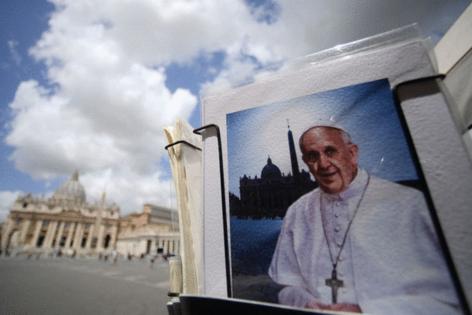Pope Francis was popular in US with many groups, data shows. What won them over?
Published in News & Features
Dubbed “the people’s pope,” Pope Francis — who died on Easter Monday at age 88 — was highly regarded by Catholics and non-Catholics alike, according to surveys.
His death was announced by the Vatican in the early hours of April 21 in a statement on X, formerly known as Twitter.
“He taught us to live the values of the Gospel with fidelity, courage, and universal love, especially in favor of the poorest and most marginalized,” said Cardinal Kevin Farrell, according to a separate statement on X.
With an unconventional ascent to the papacy and a more inclusive, progressive approach to leadership than his predecessor, according to experts, many were hopeful his election would bring people back to church. But while those hopes largely did not manifest, as church attendance in the U.S. dropped across most religious groups, according to a 2024 Gallup poll, Pope Francis did garner a rather high approval, especially among non-Catholic groups.
In the U.S., where about 20% of the population identifies as Catholic, 63% of adults said they have a “very” or “mostly” favorable view of Pope Francis, according to a 2021 Pew Research Center study.
Majorities of non-Catholics, including White Protestants who aren’t evangelical, Black Protestants, and people who said they don’t belong to any religion — also known in the study as religious “nones” — have favorable opinions of the Pope, per the same study. White evangelical protestants were divided, and data on Jewish and Muslim Americans was not included.
Ryan Burge, a leading researcher on American religious trends, told McClatchy News the approval rating among non-Catholics — specifically the religiously unaffiliated — is notable.
“There’s a lot of anti-religion amongst the nones,” he said. “Anytime you can see a religious figure scoring above 50% with non-religious people is a huge, huge deal.”
Burge compared the Pope’s ratings with how religious “nones” score evangelical leaders, with those numbers often being in the “20s and 30s,” he said.
“That’s significant in that the ‘nones’ don’t hate the Pope, which has not always been the case,” Burge said.
Why was Pope Francis so popular among non-Catholics?
There are multiple presumptions as to why Pope Francis was well liked by non-Catholics, including his humble beginnings, focus on social justice and the environment and emphasis on interfaith relations, experts said.
Francis’ less conservative stance on immigration, justice and economic issues may have helped the religious “nones” like him because these were slight changes in their direction, especially coming out of Pope Benedict’s tenure as he was seen as an “old school conservative,” according to Burge.
Being born in Argentina, Francis brought this idea that the Catholic Church is more than Europe, he added.
He often made headlines with his interfaith relationships, including his close friendship with Rabbi Abraham Skorka, said Amir Hussain, professor of theological studies at Loyola Marymount University who specializes in Islamic studies.
Hussain cited several actions the Pope took that appealed to non-Catholics, including an instance in which he washed the feet of a Muslim woman in prison.
“I think that kind of stuff reaches out to people that this genuinely is a person who cares about and is concerned with people,” he said.
Even the name he took — after St. Francis of Assisi who in 1219 met with Sultan Al-Malik al-Kamil, a Muslim leader, to foster interfaith dialogue during the Fifth Crusade — was significant, Hussain said.
“I think right from the beginning that name that he takes, if you’re a Muslim who knows your history, you think, OK, this is interesting,” he said.
Julie Byrne, Catholic studies chair at Hofstra University, agreed that Francis’ openness helped him become popular among people of different faiths.
“The Catholic Church has, at some points, seemed under recent papacies to be more insular and more interested in policing its boundaries and more interested in advocacy for Catholics only,” she said, adding that Francis helped people of other faiths feel advocated for.
With respect to religious “nones,” Byrne said Francis’ seemingly looser boundaries helped him connect with people who were not necessarily interested in religion but interested in making the world a more “peaceable place.”
“He does have a spiritual but not religious vibe,” she said. “He was someone who, in his approach to Catholicism, always emphasized the spirit of the law over the letter of the law.”
Favorability among U.S. Catholics
Pope Francis was “broadly popular” among U.S. Catholics throughout his papacy, according to data from 15 Pew Research Center surveys taken since 2013. His most recent favorability rating was 78% of Catholics viewing him positively, according to a February survey.
“Over the last seven years, U.S. Catholics have been more divided by party in their views of the pontiff than was the case earlier in his tenure,” researchers said in the poll.
While 88% of U.S. Catholics who are Democrats held a positive view of him in February, 69% of Republicans expressed a similar view, per the poll.
The survey also found that Catholics’ views of the Pope didn’t deviate much based on gender, race or ethnicity, age, or frequency of church attendance.
Byrne said while the next few weeks will include an outpouring of love for the late Pope, it’s important to also reflect on instances in which some say he may have missed the mark.
“(Pope Francis) said himself that he was not perfect, and always asked people to pray for him as he was praying for them,” she said. “And so it is in keeping with his own humility about himself, just to say that he could have done things better on some fronts.”
_____
©2025 The Charlotte Observer. Visit charlotteobserver.com. Distributed by Tribune Content Agency, LLC.







Comments